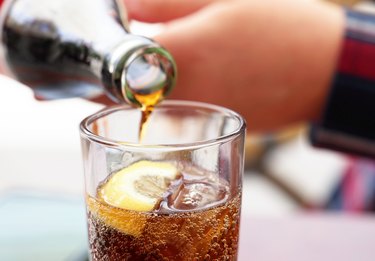
You avoid office birthday cakes, pass on breakfast pastries and skip ordering dessert. But these efforts to reduce your sugar intake — although commendable — may not be enough if you still drink soda.
The Sugar In Soda
Video of the Day
Sugar is found naturally in fruits (in the form of fructose) and milk and milk products (in the form of lactose). The majority of sugars in the typical American diet, however, come from added sugars — sugars that are added to foods and beverages when they're processed or prepared to make them taste better.
Video of the Day
It's these added sugars that nutrition experts and medical professionals have been sounding the alarm about for years, and for good reason: Research shows they are linked to a number of concerning health issues (more on that later).
And the number one source of added sugars is sugary beverages — specifically, soda. Sugar-sweetened drinks represent almost half (47 percent) of all added sugars we consume followed by snacks and sweets (31 percent) and grains (8 percent), according to the 2015-2020 Dietary Guidelines for Americans.
Soda, in particular, accounts for 25 percent of all added sugars we take in. This may seem like an unbelievable amount — until you actually look at how many teaspoons of sugar there is in soda.
Here's how much sugar is in a single, 12-ounce serving of popular soda brands:
- Mug Cream Soda: 47 grams of sugar or 11.75 teaspoons of sugar
- Mountain Dew: 46 grams of sugar or 11.5 teaspoons of sugar
- Fanta Orange: 44 grams of sugar or 11 teaspoons of sugar
- Cherry Coke: 42 grams of sugar or 10.5 teaspoons of sugar
- Pepsi: 41 grams of sugar or 10.25 teaspoons of sugar
- Coca-Cola, Original: 39 grams of added sugar or 9.75 teaspoons
Read more: How Much Weight Can You Lose by Not Drinking Soda?
The Harmful Effects of Soda
Do you ever grab a soda for a much-needed, mid-afternoon pick-me-up only to experience the exact opposite — lethargy, tiredness, moodiness — less than an hour later? There's a reason for that.
"Too much sugar spikes insulin levels, which leads to a drop in blood sugar and reduced energy," Lara Metz, RDN, a New York City-based registered dietitian-nutritionist, tells LIVESTRONG.com. Plus, eating or drinking too much sugar can also cause wrinkles, inflammation, joint pain and even erectile dysfunction, which is often linked to diabetes, Metz adds.
And, according to New York City-based dietitian Melissa Rifkin, RD, other ill effects resulting from taking in too much sugar include acne, bloat, reduced immunity and poor glycemic control.
Both Metz and Rifkin also warn that soda can also have several adverse long-term health effects. In fact, an April 2016 review of 32 studies shows a link between sugar-sweetened beverages and obesity, per research published in the Journal of the Academy of Nutrition and Dietetics.
What's more, drinking more than a half-serving of sugary drinks (hello, soda) a day over a four-year period was associated with a 16 percent higher risk of type 2 diabetes, according to a September 2019 study published in Diabetes Care. Still, another April 2014 study published in JAMA linked too much added sugar with an increased risk of dying from heart disease.
Sipping at least one sugary beverage every day was associated with a 98-percent higher chance of developing low HDL cholesterol and a 53-percent higher chance of developing high triglycerides — two risk factors for heart disease — according to a February 2020 study in the Journal of the American Heart Association.
And that's not all: People who are overweight were observed to have more moderate-to-severe tooth wear — and researchers partially attribute these teeth-degrading effects to sugary, acidic drinks, such as soft drinks, per an October 2019 article published in Clinical Oral Investigations.
Tips to Quit Soda
Want to kick the soda habit? Rifkin explains why it can be so challenging. "Soda is addicting," she tells LIVESTRONG.com. "Our brains come to depend on the pleasurable dopamine high we get from consuming all that sugar, making it that much harder to quit."
Still, she encourages her clients to cut it from their diet, especially if they're looking to lose weight, reduce bloat, boost energy levels and simply feel better.
According to Metz, some people can go cold turkey and eliminate soda from day one, while others prefer to wean off sugary beverages over time. Whichever method you choose, here are some tips to help increase your chance of success:
- Consider swapping your favorite soda or sugary beverage with a low-calorie sip that tastes similar. For example, if you love orange soda, switch to flavored low-sugar or zero-sugar sparkling water like Spindrift or Bubly.
- Switch to unsweetened iced coffee or tea.
- Use a reusable water bottle and add flavors such as citrus, berries or fresh mint leaves.
- Reduce the amount of added sugar you get from foods, since taking in excess sugar may increase those sugar cravings.
"Taste buds are adaptable," Metz says, "and after a few weeks of kicking soda to the curb, our taste buds no longer crave the added sugar." In other words, if you can commit to quitting soda, there's a very bright light at the end of the tunnel.
Tip
Try these 5 healthy ways to sweeten a drink to cut back on added sugar.
- 2015-2020 Dietary Guidelines for Americans: "Added Sugars"
- Journal of the Academy of Nutrition and Dietetics: "Sugar-Sweetened Beverages and Obesity Risk in Children and Adolescents: A Systematic Analysis on How Methodological Quality May Influence Conclusions"
- Diabetes Care: "Changes in Consumption of Sugary Beverages and Artificially Sweetened Beverages and Subsequent Risk of Type 2 Diabetes: Results From Three Large Prospective U.S. Cohorts of Women and Men"
- JAMA: "Added Sugar Intake and Cardiovascular Diseases Mortality Among US Adults"
- Clinical Oral Investigations: "Obesity and Tooth Wear Among American Adults: the Role of Sugar-sweetened Acidic Drinks"